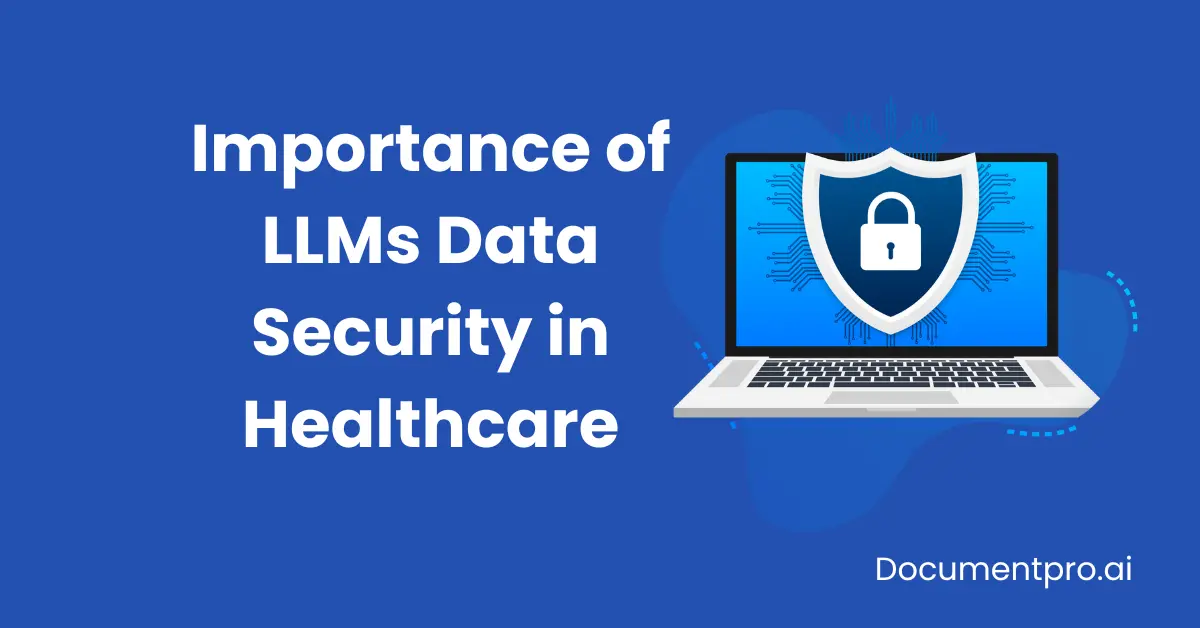
Importance of LLM Data Security in Healthcare
In healthcare, protecting sensitive data is paramount. As we embrace advanced technologies like Large Language Models (LLMs), the machine learning systems behind tools like chatbots, and AI-driven medical solutions, it's vital to understand the importance of data security. Healthcare data is more than just numbers; it often includes personally identifiable information (PII), which, if compromised, could have serious consequences for patients and healthcare providers.
Automate Healthcare Document Data Extraction with DocumentPro
What is Personally Identifiable Information (PII)?
PII is any information that can identify an individual. In healthcare, it includes:
- Names
- Birthdates
- Medical records
- Insurance information
- Social Security numbers
- Contact details
Since this information is deeply personal, it must be stored, processed, and transmitted securely.
The Role of LLMs in Healthcare
LLMs can enhance healthcare services in various ways:
- Medical Chatbots: Answering patient queries and providing health advice.
- Data Processing: Analyzing vast medical data for research or treatment plans.
- Document Automation: Simplifying the creation of reports, patient histories, and summaries.
While these tools offer great benefits, they also present risks if handled in a way that is handled securely.
Why Data Security is Crucial in LLMs ?
When applied to healthcare, LLMs often handle sensitive PII, including patient records. If security measures are weak or compromised, the following can happen:
- Patient Privacy Violations
Leaks of PII could expose patients to identity theft, discrimination, or stigma related to their medical conditions. - Legal Consequences
Healthcare providers must comply with laws such as HIPAA (Health Insurance Portability and Accountability Act) in the U.S. or GDPR (General Data Protection Regulation) in Europe, which mandate strict personal and medical data handling. Non-compliance can lead to fines, lawsuits, or loss of reputation. - Trust Erosion
Patients expect their medical data to be kept private. A breach could damage the trust between patients and healthcare providers, harming the provider's reputation. - Financial Losses
Breaches of healthcare data can be costly. Besides regulatory fines, institutions could face massive legal fees, compensation payouts, and even disruptions to operations.
Is it safe to use LLM APIs for healthcare data?
Yes, it can be safe to use LLM APIs for healthcare data, but strict security measures are essential. Ensure the API complies with regulations like HIPAA and GDPR, requiring encryption of data both in transit and at rest.
Data anonymization should be applied to protect personally identifiable information (PII). Implement strong access controls such as multi-factor authentication (MFA) and restrict data sharing to authorized personnel.
The API provider should sign a Business Associate Agreement (BAA) if dealing with protected health information (PHI) and be transparent about their data handling practices, including data retention and deletion policies. Regular audits and monitoring should be conducted to detect unauthorized access.
Data minimization, sending only necessary data, further reduces risks. When these protocols are followed, LLM APIs can be a secure solution for handling sensitive healthcare data.
Key Security Considerations for LLMs in Healthcare
Given these risks, healthcare providers must implement robust security protocols when using LLMs. Here are the main areas to focus on:
1. Data Encryption
Encryption is essential to protect sensitive data. By ensuring that patient data is encrypted both at rest (when stored) and in transit (when transmitted), healthcare providers reduce the risk of unauthorized access.
2. Anonymization of PII
LLMs should work with anonymized data whenever possible. By stripping PII from the data, sensitive patient information won’t be exposed even if a breach occurs. Anonymization means converting identifiable information into an unidentifiable form without losing the data's utility for the model's purpose.
3. Access Control
Only authorized personnel should have access to systems using LLMs. Implementing multi-factor authentication (MFA) and role-based access controls ensures that sensitive data is only accessible to individuals with the proper credentials.
4. Regular Audits and Monitoring
Continuous monitoring of LLMs and data systems for unauthorized access or unusual activity can help prevent breaches before they happen. Regular audits can identify vulnerabilities in the system and provide a chance to address them proactively.
5. Compliance with Legal Standards
Healthcare providers should ensure their systems comply with data protection laws such as HIPAA, GDPR, or local regulations. This means keeping up with the latest requirements and adjusting data-handling practices.
6. Training and Awareness
It’s essential to train healthcare staff on data security best practices. Human error can be a weak link even with the most secure systems. Teaching employees how to handle PII and detect potential threats can reduce the likelihood of breaches.
7. Data Minimization
Only the necessary amount of PII should be collected and processed by LLMs. This principle limits the amount of sensitive information that can be exposed during a breach.
Real-World Examples of LLM Data Security in Healthcare
In 2021, a U.S. hospital group experienced a data breach that compromised over 1 million patient records, including PII such as names, Social Security numbers, and health records. This incident underscores the importance of data security, especially as LLMs become more integrated into healthcare.
In contrast, several healthcare providers have implemented LLMs while maintaining strict security protocols, including encrypted communications, anonymized data for AI models, and rigorous compliance measures.
These successful implementations show that LLMs can enhance healthcare without compromising data security when safeguards are in place.
Also Read: How LLMs are Used to Extract Data from Documents? A Comprehensive Guide
Conclusion
Adopting LLMs in healthcare can significantly improve patient care and operational efficiency. However, it’s crucial to prioritize data security to protect sensitive PII from breaches and misuse. By encrypting data, anonymizing PII, enforcing strict access controls, conducting regular audits, and complying with legal standards, healthcare providers can harness the power of LLMs without compromising patient privacy and trust.
Data security is not just an operational necessity. It’s a critical part of safeguarding patient well-being and upholding the integrity of healthcare systems.
